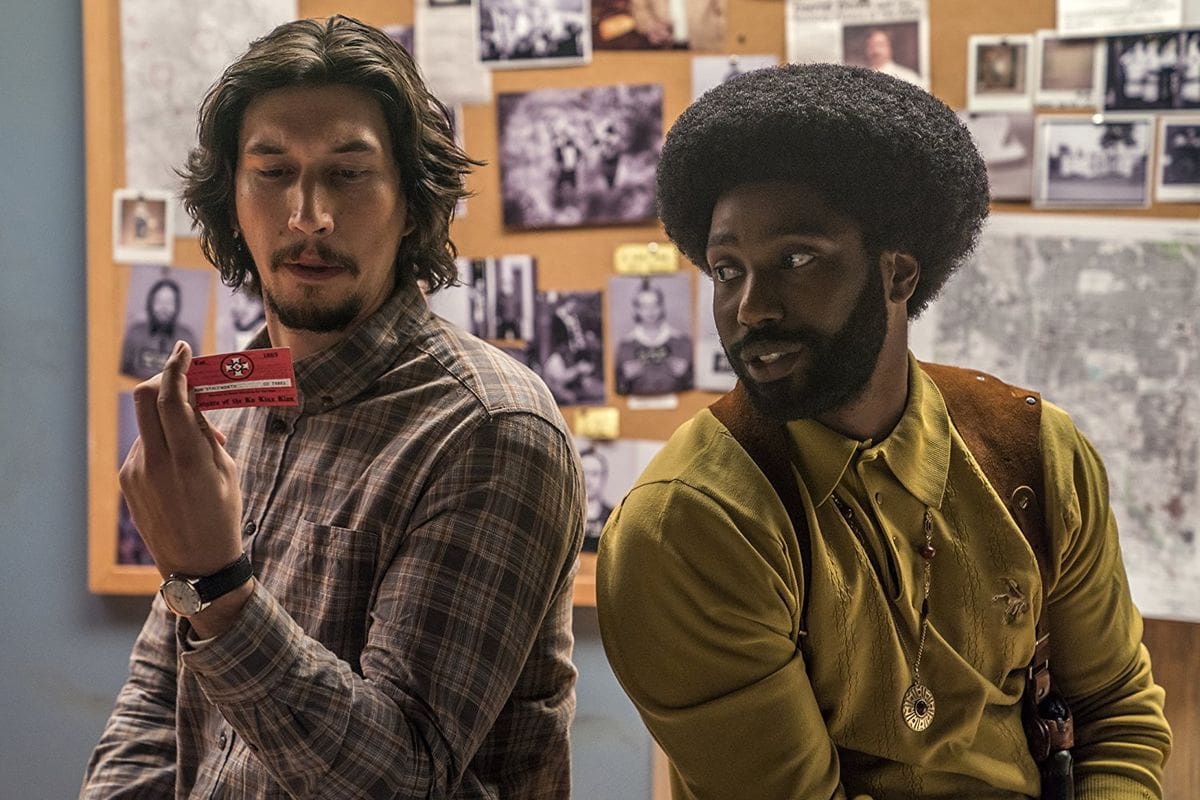
Spike Lee’s new film BlacKkKlansman begins in the most unexpected way: with a clip from 1939’s Gone with the Wind. As the camera slowly pulls back, Vivien Leigh’s Scarlet O’Hara looks on in horror at hundreds of wounded Confederate soldiers laying on the ground. Lee, who has taught film at NYU since the early ‘90s, knows that from Buster Keaton’s The General to last year’s The Beguiled remake, Hollywood has a rich history of lamenting the nobility and independence the South lost in the Civil War. BlacKkKlansman however, is a rebuff to that history.
Set in the early ‘70s, it tells the story of Colorado Springs’ first black policeman Ron Stallworth’s (John David Washington) infiltration of the local KKK chapter. While Stallworth necessarily conducts most of his KKK business over the phone, he employs fellow detective, Flip Zimmerman (Adam Driver, who isn’t Jewish but plays it here) to assume his identity in face-to-face meetings. Further complicating matters, Ron has also infiltrated the local Black Students’ Union and begins dating its president, Patrice Dumas (Laura Harrier). It’s a story so insane it could only be true.
However, as Lee explained in a live Q & A that streamed nationwide before my screening, he wants everyone to laugh at this movie and while what happens is often deathly serious, BlacKkKlansman is mostly a farce. Surprisingly, most of that comedy comes from Stallworth and Zimmerman’s interactions with the racist KKK members. Dangerous as they can be, they’re mostly portrayed as buffoons here. While Paul Walter Hauser shows the same obnoxious desperation for camera time here as he did in I, Tonya, the rest of the cast is perfectly calibrated.
Perhaps the best scenes are the phone calls between Stallworth and then-Grand Wizard and current Trump supporter, David Duke (Topher Grace). Where Washington perfectly conveys the character’s simultaneous simmering disdain and smug satisfaction at tricking Duke, Grace plays the unsuspecting fool. No matter what hatefully racist thing Stallworth says, Duke accepts it with a chilling geniality.
Grace’s best moment, though, comes late in the movie, when Duke and Stallworth meet in real life. After being assigned to Duke’s protection detail, Stallworth asks to take a picture with him. Duke accepts out of politeness, but Grace makes it clear how disgusted Duke is by the idea. That disgust turns dangerous when Ron puts his arm around him at the last second. Suddenly, Duke’s politeness shifts to anger and the danger and hatred surrounding Stallworth in that room full of KKK members becomes palpable. It’s a great moment, but it’s unfortunately one of the few moments that isn’t undercut by humor.
For all its merits, BlacKkKlansman’s downfall may be its mix of humor and resonance with current events. Sometimes it works — like when Duke says America needs to find its greatness again. But most of the time, the humor seems at war with the subject matter.
Perhaps the best example comes in a scene that cuts between a Klan initiation and a speaker named Jerome Turner (played by no less than Harry Belafonte) at the Black Students’ Union. While the new KKK recruits are anointed, we occasionally cut back to Jerome telling a story about a young, mentally disabled black man who was brutally murdered by white people. As the scene goes on, it becomes more difficult to continue dismissing the KKK members as ridiculous because their ideas are dangerous when put into practice. That only intensifies once Lee brings D.W. Griffith’s The Birth of a Nation into the mix.
As the Klansmen cheer through the pro-KKK film, Lee and editor Barry Alexander Brown cut back to Turner describing the way white Americans (only half a century removed from the Civil War at the film’s release in 1915) fawned over it — including a screening then-president Woodrow Wilson at the White House. There’s a lot going on in that moment (an indictment of the way governments can tacitly encourage racism, the role of popular culture in enforcing dangerous beliefs), but what makes it so effective is that it’s played seriously and with a kinetic editing that is common of Lee’s films but has never felt quite so powerful.
Lee’s work can often feel like controlled chaos energy-wise, but there’s a focus to BlacKkKlansman‘s storytelling and razor-sharp wit because every moment is meant to comment on current events. For most of the film’s runtime, that desire to satirize duels with the desire to condemn and those who like one tone may not necessarily like the other. No scene illustrates that better than the section at the end when, after we watch Stallworth play one final trick on Duke, the film becomes a brief, brutal documentary of what happened in Charlottesville, Virginia last year. Lee’s rapid, evocative style lends itself well to the way footage (much of it familiar to anyone who followed the story) unfolds and it’s hard to take pleasure in Stallworth’s victory knowing that small victories like that may have little long term effect.
As two girls who were discussing the film in the bathroom (my favorite place to gauge audience reactions) after the screening argued, the scene is “sobering.” It’s a huge tonal departure and one that not every audience member will accept. But what makes BlacKkKlansman such a good film is just how challenging it is. Lee is taking white Americans, Hollywood and even the audience to task for our roles in creating the world we live in. To ignore that challenge simply because it makes us uncomfortable would mean missing the whole point.
Rating: 7.5/10

